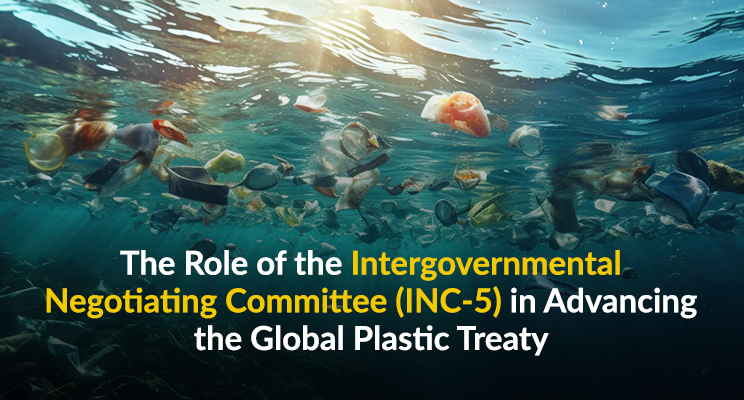Plastic pollution is becoming an increasingly urgent issue, with over 400 million tons of waste entering our oceans each year. This not only impacts marine ecosystems but also contributes to landfill overflow and even affects human health. Recognizing the severity of the crisis, the United Nations Environment Assembly (UNEA) has initiated negotiations for a global plastics treaty to establish a legally binding solution.
However, despite the pressing need for action, progress has been gradual. What challenges are hindering these efforts? Which stakeholders are most affected? And most importantly, what are the consequences of inaction?
The Intergovernmental Negotiating Committee (INC) sessions were at the core of this effort, where global leaders drafted the treaty’s policies. The INC-5 session, held from November 25 to December 1, 2024, in Busan, South Korea, marked a critical milestone, bringing together 3,800 participants from 170+ countries and 600 observer organizations.
Key discussions at INC-5 focused on corporate accountability, plastic production limits, waste management strategies, and financial support for developing nations. However, negotiations faced challenges, including economic concerns, industrial lobbying, and differing national priorities.
With the world closely watching, INC-5 played a crucial role in shaping the treaty’s final version and determining global action against plastic pollution.
Key Objectives of INC-5
Finalising Treaty Provisions
One of the most critical objectives was to finalize the provisions related to plastic waste reduction. This included agreeing on national commitments and establishing regulations that encouraged plastic producers and consumers to adopt more sustainable practices.
Creating Financial Mechanisms
For the treaty to be successful, it needed a robust financial system to support developing nations in the fight against plastic pollution. INC-5 focused on creating mechanisms for funding waste management systems, recycling technologies, and the development of alternative materials.
Corporate Accountability
Another key focus of INC-5 was discussing how to hold corporations accountable for their plastic usage and waste. This involved exploring extended producer responsibility (EPR) schemes, where companies would be responsible for the entire lifecycle of their plastic products, including post-consumer disposal.
Strengthening International Collaboration
A critical goal of INC-5 was to enhance cooperation between countries, industries, and non-governmental organizations to ensure the global scope of the treaty. Tackling plastic pollution requires collaboration at every level, from local communities to international bodies.
Global Reactions and Expectations
Global reactions to INC-5 were largely positive, with governments, environmental groups, and industry leaders all acknowledging the need for stronger international agreements on plastic pollution. Environmental NGOs were particularly hopeful that INC-5 would ensure corporations were held responsible for their contribution to plastic waste.
On the other hand, some businesses voiced concerns about the economic implications of the treaty. However, many also recognized innovative business opportunities arising from the global shift toward sustainability.
Impact of INC-5 on the Global Plastic Economy
The global plastic economy is intricately tied to both the production and disposal of plastic goods. With the Global Plastic Treaty in motion, the outcomes of INC-5 will shape the future of industries that rely on plastics, from packaging to electronics.
Key changes expected include a push towards sustainable packaging, increased reliance on biodegradable materials, and stronger enforcement of waste management standards. Companies may also face new regulations requiring them to reduce plastic production and improve recycling rates.
Implementing financial mechanisms from INC-5 was also likely to stimulate growth in the circular economy, providing incentives for companies to invest in sustainable alternatives and reduce their environmental footprint.
What’s Next After INC-5?
After INC-5, the treaty negotiations will continue with further sessions, including INC-6, where additional technical details and national commitments will be finalised. By the end of the INC series, it’s expected that the treaty will be adopted and ratified by UN member states, leading to its full implementation.
The INC-5 represents a critical moment for shaping the future of global plastic waste management. The outcomes of this session will be effective for corporations and governments and will positively impact the future of our planet’s ecosystems and biodiversity.
The success of this hinges on global cooperation, and every stakeholder—governments, businesses, and consumers—must play their part. As the global plastic economy transitions, we all play a role in supporting the shift toward sustainability.


